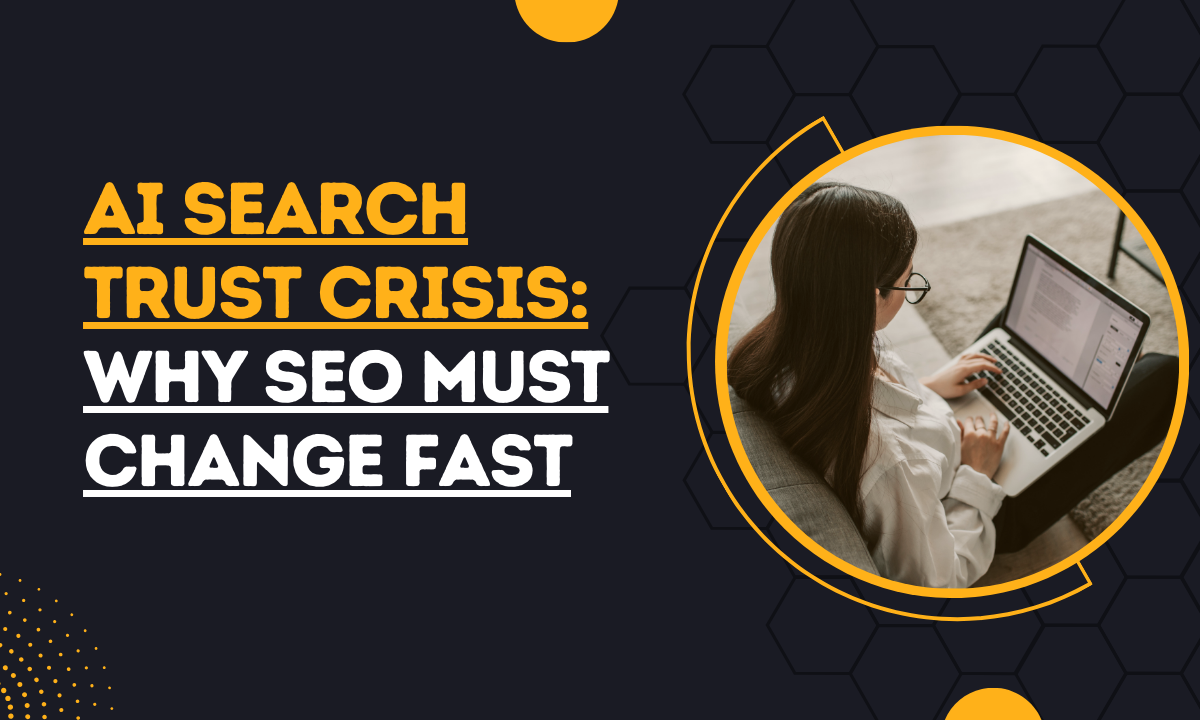AI Search Trust Crisis: Why SEO Must Change Fast
AI Search Trust is becoming the defining factor of modern search behavior, and every marketer who ignores this shift risks falling behind.
As AI-generated answers multiply and user expectations rise, the old rules of SEO no longer apply. Search is becoming faster, more conversational, and far more demanding.
Trust, authority, and depth now matter more than surface-level visibility.
The landscape is shifting fast, and the brands that adapt will survive.
The ones that cling to vanity metrics will not.
This article breaks down the clearest insights from industry-leading voices and shows how to rethink SEO in the age of AI search trust.
Background: What the MozCon Conference Is About
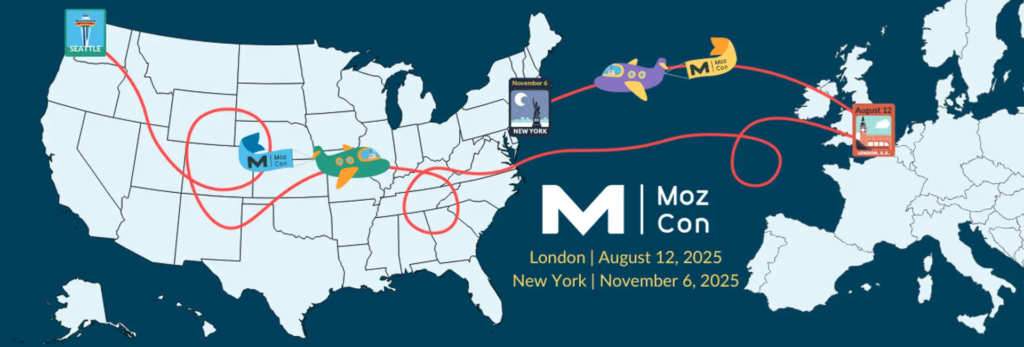
MozCon London has become one of the most respected gatherings for search professionals.
It is known for bringing together some of the brightest thinkers in SEO, content strategy, and search behaviour.
The 2025 edition continued that tradition, offering a deep exploration of how AI, semantic search, and shifting user expectations are transforming digital discovery.
The event featured leading experts including Dr. Pete Meyers, Areej AbuAli, Lidia Infante, Rebecca Jackson, Helen Pollitt, and Andy Chadwick, all sharing analysis based on real trends, not speculation.
What sets this conference apart is its focus on actionable insights that shape real-world strategy.
Rather than general predictions, speakers deliver research-backed observations, practical frameworks, and proven approaches that help marketers adapt to the rapid changes in search.
This year, one theme consistently echoed across sessions: AI search trust now dictates which brands get visibility, credibility, and long-term relevance.
1. Rethinking SEO Wins Through Real AI Search Trust
Why Vanity Signals Are Losing Relevance
Why chase numbers that look good but mean little?
Rebecca Jackson pointed out that impressions rising and rankings shifting slightly often give a false sense of progress.
These indicators seem encouraging, yet they rarely correlate with real-world outcomes that matter to a business.
To strengthen AI search trust, you need to watch metrics that link clearly to revenue or meaningful action.
You can take this as a reminder to stop relying on surface-level signals. Instead, you rely on authenticity signals in AI search.
Please remember that if the numbers do not change your bottom line, they are only noise.
Real progress starts once you choose metrics that reveal actual behavior rather than cosmetic movement.
Why SEO Needs a Value Centric Approach
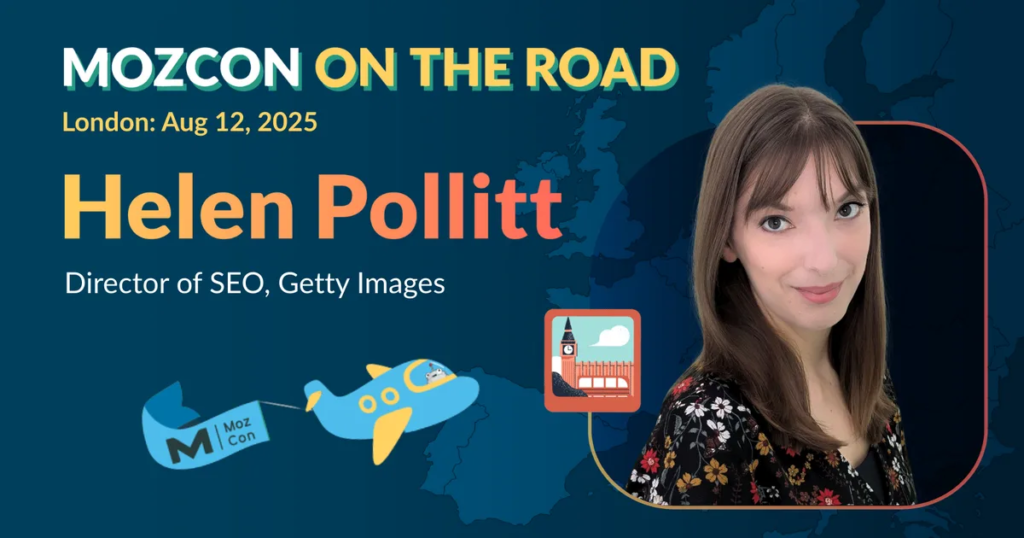
Helen Pollitt made the point sharper.
She said “Clicks don’t pay the bills”, and that single line clarifies the real gap in most SEO reporting.
Stakeholders want visible value, not dashboard drama, so you need to map the journey from search to purchase with far more precision.
When you do this consistently, you reinforce AI search trust both inside your organization and with your wider audience.
Think of it this way.
If your insights help teams understand why users arrive, why they stay, and why they convert, your role shifts from analyst to AI strategist.
That shift builds trust fast, and it sets you apart from those who only report traffic spikes without context.
2. How AI Driven Conversations Are Reshaping Search and AI Search Trust
Interpreting Meaning Instead of Matching Words
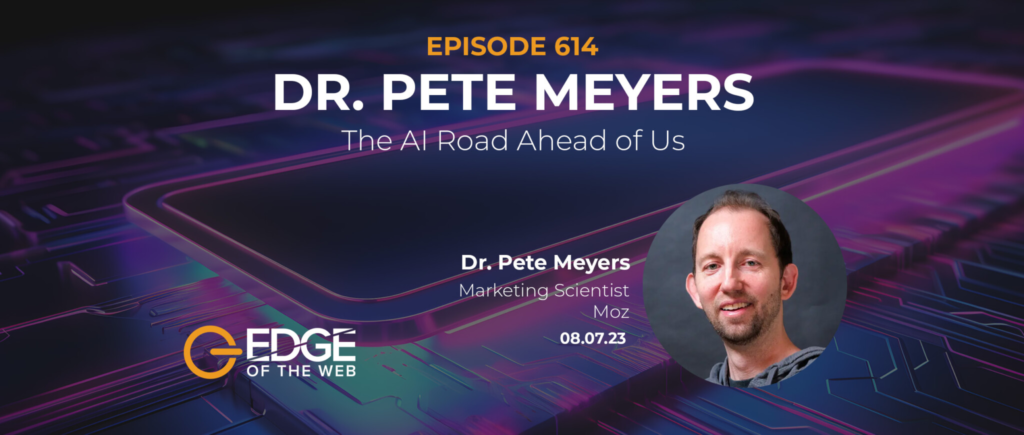
Is search still about keywords?
Not anymore.
Dr. Pete Meyers highlighted that the 2013 Hummingbird update marked Google’s shift into genuine semantic understanding.
The system moved past strict word matching and began analyzing user intent and contextual meaning.
This foundation is what supports modern AI search trust, since users rely on search engines that interpret what they meant rather than what they literally typed.
You can look at this as a turning point.
Search became less about stuffing terms and more about understanding real questions.
If you focus on what people want to solve, you start creating content that feels helpful instead of mechanical.
The Query Fan and How Intent Expands
Ever notice how one question leads to five more?
Dr. Pete explained this through his “Query Fan” model.
A simple query such as “What is the newest iPhone?”
branches into related follow ups like “How many cameras does it have?”
and later “Should I wait for the next model?”
These evolving queries are now frequently answered by AI Overviews.
Brands need deeper insights and clear expertise because AI alone cannot always build enough AI search trust in complex or high stakes topics.
Treat this pattern as a signal.
A single user intent often opens into a chain of needs, so your content should anticipate those layers.
When you answer beyond the basics, users feel supported and are more likely to return.
3. How Strong Brands Rise in Modern Search
Why Trust Now Drives Most Ranking Outcomes
Why does a brand matter so much today?
Lidia Infante stressed that brand strength has become the fundamental layer of SEO.
Large language models rely on credible signals to judge whether a source deserves visibility, and they lean heavily on brands with a history of accuracy and consistency.
When you commit to building authority over time, you increase your presence in AI generated answers, and that is where real influence begins to grow.
AI search trust acts as a quiet filter that rewards the names users already consider dependable.
You can see how this shifts your strategy.
If people recognize your work and associate it with clarity, the algorithms follow the same cues.
Trust spreads from users to systems, and systems reward what feels stable.
Consistency becomes the deciding factor, not isolated bursts of content.
How Mentions Across the Web Strengthen Authority

Source: KVRWebtech
Areej AbuAli and Charlie Merchant expanded this point by explaining how reviews, citations, and third party references fuel visibility.
These external signals feed into the training data that shapes AI behaviour.
Every credible mention becomes proof that your brand is reliable, and over time these proofs accumulate into a reputation that AI systems cannot ignore.
Repeated association with accurate information helps a brand dominate summaries, recommendations, and category level visibility.
This is where indirect reputation becomes measurable.
You can think of it like word of mouth at scale.
The more the web talks about you, the easier it is for AI to recognise your expertise.
You build reach through trust, and you build trust through consistent quality.
It is a simple pattern, but extremely powerful when applied with patience.
4. How Modern Content Strategy Needs to Shift
Understanding the New Affinity-Led Content Approach
Why does affinity matter so much today?
Chima Mmeje introduced a refreshed content framework that places affinity at the centre of planning.
Chima Mmeje
She encouraged marketers to run a structured “How did I hit?” review to study what worked, what failed, and what can be tightened for the next cycle.
The goal is to create a system where every piece grows sharper over time, and this steady improvement naturally strengthens audience confidence.
When you follow this method consistently, you support AI search trust because your content becomes recognizably reliable.
You can apply this quickly.
Look at what users respond to, then refine your voice so your material feels familiar yet improving.
When your audience senses progress, they stay longer. Stability builds, one interaction at a time.
Principles That Help Your Work Stand Out
Chima also shared three practical rules for rising above competitors.
First, use contrast so your work does not drown in lookalike content.
Second, offer richer value than others in your space through clearer explanations, deeper insights, or more helpful framing.
Third, behave like a publisher who builds regular consumption rather than hoping for occasional spikes.
She added that publishing in the spaces where your audience already spends time increases visibility and keeps your brand present in their daily flow.
This approach supports AI search trust by meeting people where their habits already exist.
You can start small.
Choose two places where your audience is active, then show up there repeatedly.
Share depth, not noise.
Over time, your presence becomes part of their routine, and that routine turns into trust.
5. AI Tools Work With You, Not Instead of You
Building Useful Tools Without Writing Code
Do you really need to code to create something useful today?
Andy Chadwick proved you do not.
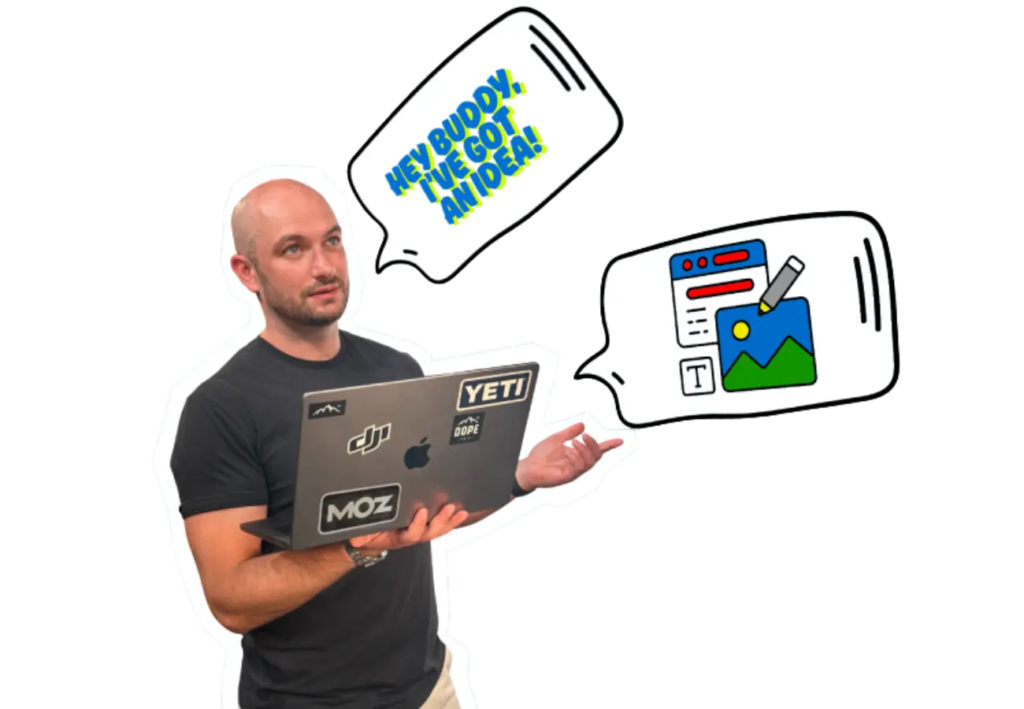
He demonstrated how AI can help marketers assemble practical tools without touching a programming language.
By pairing the Moz API with OpenAI, he developed a keyword scoring system that speeds up research and sharpens decisions.
This kind of setup lifts day-to-day efficiency and guides smarter planning, which naturally supports more dependable output.
When you think of AI as a partner instead of a substitute, you reinforce AI search trust through reliable, structured processes.
You can test this idea yourself.
Start small, use simple APIs, and let AI organize the heavy lifting. Once you see how much time it saves, you begin trusting your own workflow more.
That confidence becomes a real asset.
Smarter Workflows That Strengthen Strategy
Andy also showed how clustering through Keyword Insights allows thousands of keywords to be sorted instantly.
This speed is more than convenience.
It frees teams from repetitive sorting so they can focus on interpreting patterns and choosing high-value targets.
The real advantage comes from using AI to enhance human judgment rather than replace it.
That balance produces clearer decisions and supports AI search trust for users who want steady, authoritative guidance.
You get more space to think when the grunt work is handled for you.
That space helps you choose better topics, refine your priorities, and plan content with purpose.
In the long run, you spend less time guessing and more time doing meaningful work.
Core Strategic Takeaways for Strengthening AI Search Trust
| Strategic Takeaways | Practical Guidance for You |
|---|---|
| Seeing Past Empty SEO Signals | Track metrics that reveal real user behaviour and revenue impact. When you stop relying on shallow numbers, your decisions sharpen. You begin seeing what actually drives progress instead of what only looks impressive on dashboards. This clarity builds steadier AI search trust over time. |
| When Search Becomes Conversational | Write for meaning instead of keywords. Users respond when your content mirrors their real questions. As you shape material around intent patterns, your work becomes naturally more helpful. This approach earns trust because people feel understood instead of targeted. |
| Why Brand Reliability Drives Visibility | Make reliability your ranking strategy. When people recognise your voice and associate it with accuracy, algorithms follow the same pattern. Authority grows through repeated quality, not scattered wins. This keeps your presence stable across search environments. |
| Creating Content That Builds Affinity | Study what resonates, then refine your approach so your content becomes familiar and dependable. When your audience senses consistent improvement, they stay longer. That ongoing presence nurtures long-term trust and deeper connection. |
| Using AI to Amplify Your Strengths | Allow AI to handle repetitive tasks while you focus on judgment and creativity. When tools manage sorting and clustering, you gain mental space for better decisions. This balanced workflow produces reliable output and strengthens AI search trust naturally. |
FAQs
How do search credibility signals influence visibility?
Search credibility signals help search engines understand how trustworthy and authoritative your content is. These include reviews, citations, expert mentions, and consistent accuracy across pages. When these signals are strong, your content is more likely to appear in high-trust placements.
What are AI-driven ranking factors?
AI-driven ranking factors refer to machine learning systems that evaluate patterns in user behaviour, high content quality, and intent satisfaction. The system rewards pages that consistently answer questions well and maintain user engagement. The better your alignment with these patterns, the stronger your rankings.
Why is semantic search optimization important?
Semantic search optimization focuses on meaning rather than exact keyword matches. It helps search engines understand user intent and context, which improves your chances of appearing for a broader set of queries. This creates more durable visibility as search becomes more conversational.
How does brand authority in search impact performance?
Strong brand authority acts as a trust shortcut for both users and AI systems. When your brand is mentioned frequently across reputable sources, search engines interpret you as a dependable reference. This reduces distrust in AI summaries, boosts recommendations, and raises organic rankings.
What are content reliability metrics?
Content reliability metrics measure how accurate, consistent, and up to date your information is. Signals like factual correctness, citations, and user engagement help search engines judge the reliability of your pages. High reliability strengthens your presence in trust-based search environments.
Why does intent-focused search strategy matter?
An intent-focused strategy ensures your content solves the real problem behind a user’s query. When users find exactly what they need, they stay longer and interact more, which search engines treat as a relevance signal. This creates a feedback loop that improves ranking and trust.
How do trust-based SEO frameworks work?
Trust-based frameworks emphasize clarity, accuracy, AI transparency, and consistent value across all content. Instead of chasing keywords, they focus on meeting user expectations and reducing uncertainty. This approach builds long-term credibility that search engines recognise.
What are AI-powered content workflows?
AI-powered workflows automate repetitive tasks like clustering, summarising, and keyword sorting while leaving strategic thinking to the human expert. This increases output quality and reduces the time spent on mechanical work. When used correctly, it improves both efficiency and decision-making.
Related Posts
Authenticity Signals in AI Search: Why Users Trust Real Voices
Crack AEO Search Optimization or Get Buried by AI Engines
Let AI Assist Your Creative Voice Rather Than Replace You
AI Search Optimization — Why Old SEO Won’t Save You Now
Conclusion
AI search trust must guide every SEO decision going forward, because the search landscape now rewards depth, authority, and credibility more than ever.
The insights from MozCon London made one thing clear.
AI will continue shaping discovery, but brands that cultivate trust, produce consistent expertise, and connect their content to real user needs will rise above the shifting algorithms.
As AI-produced answers expand, users will depend even more on sources that feel reliable.
This is the moment for marketers to evolve strategies, strengthen authority, and invest in trust signals that sustain long-term AI search trust.

